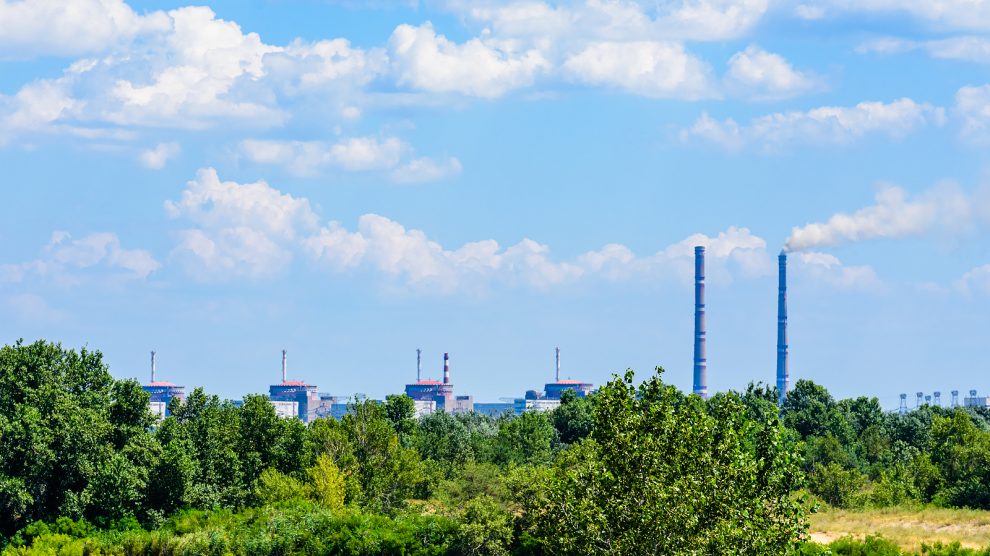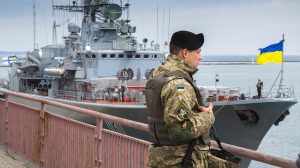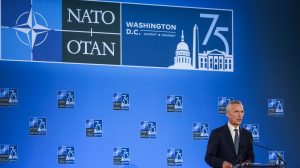You can read all of our coverage of Russia’s invasion of Ukraine, including explainers and articles offering context and background information here.
Russia’s invasion of Ukraine
Ukraine’s President Volodymyr Zelensky said on Thursday that he’s been warned by his country’s intelligence services that Russia is considering carrying out a “terrorist act” on the Zaporizhzhia nuclear power plant that it’s currently occupying in southern Ukraine.
Zelenskyy said “intelligence has received information that Russia is considering the scenario of a terrorist act at the Zaporizhzhia nuclear plant — a terrorist act with the release of radiation. They have prepared everything for this,” he said, without giving further detail on the evidence underlying the intelligence.
The Kremlin responded to the allegation Thursday by calling it “another lie”.
Russian President Vladimir Putin told his Security Council Thursday that the West was pushing Kyiv to “fight with Russia up until the last Ukrainian” and that the counteroffensive potential of Ukraine was “not yet depleted, multiple strategic reserves have not been utilised.”
One of Europe’s largest reservoirs is drying up after the destruction of the Kakhovka Dam in southern Ukraine.
Satellite images show four canal networks have become disconnected from the Kakhovka Reservoir. The United Nations says drinking water supplies could be affected for more than 700,000 people, mostly in Russian-occupied areas.
Experts say the loss of water from the canals would be critical for food production in the region.
The Kakhovka Dam was destroyed in the early hours of June 6, causing widespread flooding which hit settlements and farmland across the region.
European Union governments agreed on Wednesday to an eleventh package of sanctions against Russia over its invasion of Ukraine, aimed at stopping other countries and companies from circumventing existing measures.
The new package forbids transit via Russia of an expanded list of goods and technology which might aid Russia’s military or security sector.
The biggest novelty, diplomats said, was enabling restrictions on the sale of sensitive dual-use goods and technology to third countries that might sell it on to Russia.
Russian-appointed officials said on Thursday that Ukrainian missiles struck the Chonhar road bridge connecting Crimea with Russian-held parts of the southern Kherson region overnight, forcing traffic to be diverted to a different route.
Chonhar, the so-called “gate to Crimea” is one of a handful of links between Crimea — which Moscow annexed from Ukraine in 2014 — and mainland Ukraine. It is on a route used by the Russian military to move between Crimea and other parts of Ukraine under its control.
Kyiv says it wants to retake Crimea and drive all Russian forces from its territory. Yuriy Sobolevsky, a Ukrainian official on the governing body for the Kherson region, said the strike was “a blow to the military logistics of the occupiers”.

Other news from the region
Estonia legalised same-sex marriage on Tuesday, becoming the first Baltic country to give same-sex couples the legal right to wed. “I’m proud of my country. We’re building a society where everyone’s rights are respected and people can love freely,” said Estonian Prime Minister Kaja Kallas, adding that the act will enter into force in 2024. Latvia and Lithuania, the other two Baltic countries which were previously annexed by the Soviet Union, have same-sex partnership bills stuck in their parliaments.
Slovakia’s president Zuzana Čaputová, a standard bearer for liberal politics in Central Europe and her country’s first female president, will not seek re-election next year, adding to doubts over the country’s pro-Western politics. Čaputová was elected in 2019 on a pledge to uproot corruption, after the assassinations of a journalist and his fiancée sparked mass street protests and eventually forced the resignation of Moscow-friendly ex-premier Robert Fico. After a year of political turmoil, Fico and his Smer party are now frontrunners to win a snap parliamentary election in September.
Prishtina announced it is blocking lorries with Serbian license plates from entering Kosovo over what it described as the false arrest of three Kosovan police officers by the Serbian authorities. Truck drivers from Kosovo who can’t enter Serbia are protesting by blockading the border, hoping this will speed up Pristina’s decision to cancel the measure which prohibits the crossing of trucks with Serbian goods and trucks with Serbian license plates. From Kraljevo to the Jarinje crossing, there are a total of 700 trucks with goods waiting to pass to the southern province.
The authorities in Nagorno-Karabakh have warned of looming shortages of critical supplies, after traffic along the Lachin Corridor connecting the region to Armenia was closed by Azerbaijan. A source in the Azerbaijani military with knowledge of the matter and the Red Cross confirmed that all traffic had been blocked since last Thursday, following a shooting at the Azerbaijani checkpoint at the entrance to the Lachin Corridor earlier that day. Nagorno-Karabakh has relied on supplies delivered by the Russian peacekeeping mission to the region and the Red Cross through the Lachin Corridor since December 2022, when it first came under blockade.
Poland may hold a national referendum on a European Union migration deal on the same day as elections set for the autumn. Under the deal, each member of the EU would be responsible for admitting a set number of migrants but could make payments of around 20,000 euros per person to other states if they do not wish to host them. A majority of EU states approved the migrant relocation plan, with only Poland and Hungary voting against it. The ruling national-conservative Law and Justice (PiS) party along with the far right passed a resolution in parliament opposing the EU plan.
Parliamentarians in the Serb-dominated Republika Srpska entity endorsed legal changes that are intended to allow them to ignore decisions made by Bosnia’s international overseer, the High Representative. Republika Srpska leaders claim the current international envoy, German diplomat Christian Schmidt, is illegitimate because his appointment in 2021 was not confirmed by the United Nations Security Council. The High Representative oversees the civilian implementation of the peace deal that ended the Bosnian war and has certain powers to impose decisions. In fewer than two years of his mandate in Bosnia, Schmidt used these so-called ‘Bonn powers’ on a number of occasions.
Romania this week gave the green light to start construction of a long-awaited gas pipeline that will link the Neptun Deep offshore gas development to the country’s gas transmission network while also enabling the delivery of imported natural gas to the southern part of the country. The project, known as Tuzla-Podisor, includes a 32-kilometre offshore segment that will take future gas production from Neptun Deep to shore.A longer onshore segment will extend from the settlement of Tuzla on the Black Sea shore to southern Romania, terminating near Podisor west of the capital, Bucharest.
Uzbekistan has reached a deal with Russia’s Gazprom to buy 2.8 billion cubic metres of natural gas annually over the coming two years as part of a broader effort to prevent winter-time shortages. While short of the six billion cubic metres per year deal that the Russian media had forecast earlier this month, the agreement marks a breakthrough in Moscow’s fraught efforts to negotiate the sale of gas to buyers in Central Asia. For the gas to be sent from Russia to Uzbekistan, it will need to be pumped via Kazakhstan through the Central Asia-Center (CAC) pipeline, which has historically been used to carry gas from south to north.
Unlike many news and information platforms, Emerging Europe is free to read, and always will be. There is no paywall here. We are independent, not affiliated with nor representing any political party or business organisation. We want the very best for emerging Europe, nothing more, nothing less. Your support will help us continue to spread the word about this amazing region.
You can contribute here. Thank you.







Add Comment